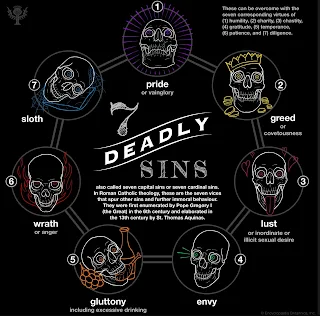Introduction
In Catholic Christian theology, the battle between good and evil is not always fought in visible realms. Often, it takes place in the mind, where thoughts arise, linger, and influence behavior. Demons, as understood in this tradition, exploit human weakness by planting sinful ideas, creating illusions, and manipulating emotions to lead people away from God. This post delves into the seven capital sins and explains how demons might subtly infiltrate our minds, pushing us toward these sins while making us believe these thoughts originate solely from ourselves.
1. Pride: The Root of All Sins
Pride, considered the first and most dangerous sin, is the excessive love of oneself over others and even over God. Demons can exploit pride by planting thoughts like:
- “I am better than others.”
- “I don’t need God to succeed.”
These thoughts may feel empowering, but they subtly isolate us from humility, the virtue needed to recognize God's authority. The enemy twists our natural desire for self-improvement into arrogance and disdain for others.
2. Envy: The Poison of Comparison
Envy arises when we covet what others have, whether material possessions, success, or relationships. Demons sow seeds of envy through thoughts such as:
- “Why do they have more than me?”
- “I deserve that, not them.”
These ideas might lead to bitterness and resentment, pulling us away from gratitude and love. The demon’s aim is to distort our view of God’s blessings and create dissatisfaction with our own lives.
3. Wrath: The Fire of Uncontrolled Anger
Wrath is intense anger that leads to hatred, violence, or revenge. Demons can incite wrath by replaying scenarios in our minds where we feel wronged, fueling thoughts like:
- “They need to pay for what they did.”
- “I can’t forgive them.”
By fixating on these ideas, demons make forgiveness seem impossible, trapping us in cycles of hostility and estrangement from peace.
4. Sloth: Spiritual and Mental Laziness
Sloth is not just physical laziness but also spiritual apathy—resistance to prayer, worship, or acts of charity. Demons whisper discouragement:
- “Why bother praying? It won’t help.”
- “There’s no time for spiritual matters.”
These thoughts sap motivation and weaken the will to pursue God’s grace, leading to a spiritual stagnation that makes us more vulnerable to further attacks.
5. Greed: The Insatiable Desire for More
Greed drives us to obsess over wealth, possessions, or power. Demons foster greed by enticing us with thoughts such as:
- “You need more to be happy.”
- “If you had that, life would be perfect.”
These deceptions distract us from spiritual richness, chaining us to material pursuits that never truly satisfy.
6. Gluttony: Overindulgence Without Restraint
Gluttony is the excessive consumption of food, drink, or other pleasures. Demons amplify cravings by planting ideas like:
- “You deserve this indulgence—just one more.”
- “Life is short; enjoy yourself.”
Such thoughts make self-control seem unnecessary, leading to overindulgence and neglect of moderation.
7. Lust: The Distortion of Love
Lust reduces human relationships to mere physical pleasure, stripping them of genuine love and respect. Demons bombard the mind with vivid, impure images or fantasies, whispering:
- “No one will know.”
- “It’s just a thought; it doesn’t matter.”
These intrusions aim to normalize sinful desires, separating love from its sacred, divine purpose.
How Demons Work in Our Minds
Demons operate subtly, often disguising their influence to make us believe sinful thoughts are entirely our own. They manipulate emotions, memories, and desires to align with the capital sins. Here’s how they infiltrate:
- Suggestions: Introducing an idea or image that appeals to our weaknesses.
- Amplification: Exaggerating feelings of inadequacy, anger, or desire to distort our perspective.
- Isolation: Convincing us that no one else struggles with these thoughts, leading to shame and silence.
- Justification: Providing excuses to make sinful actions seem acceptable or necessary.
By making sin appear attractive, logical, or inevitable, demons push us further from God’s grace.
Defending Against Demonic Influence
The Catholic Church offers several spiritual tools to counter these attacks:
- Prayer: Regular prayer, especially the Rosary, strengthens the mind and soul.
- Sacraments: Frequent confession and receiving the Eucharist cleanse and fortify against sin.
- Scripture: Meditating on God’s Word provides clarity and guidance.
- Virtue: Cultivating the opposing virtues—humility, charity, patience, diligence, generosity, temperance, and chastity—undermines the power of the capital sins.
- Discernment: Recognize intrusive thoughts as potentially demonic, not as reflections of your true self.
Conclusion
Demons attack through thoughts, exploiting the seven capital sins to steer us away from God. By recognizing these tactics, we can arm ourselves with prayer, virtue, and discernment. Always remember: while these thoughts may feel personal, they are often external temptations designed to deceive. With God’s grace and the tools of the Church, we can resist and reclaim our minds for holiness.
This post aims to educate both geologists exploring the spiritual dimension of human consciousness and Catholic Christians seeking deeper insight into the battle against sin. The path to salvation is not just external but an ongoing, internal fight for the soul. Let us stand firm, united in faith and vigilance.


No comments:
Post a Comment
Note: Only a member of this blog may post a comment.